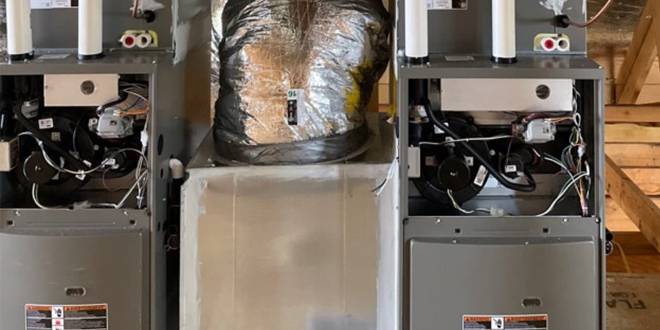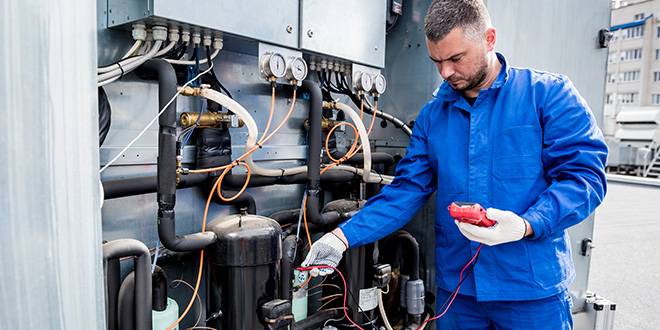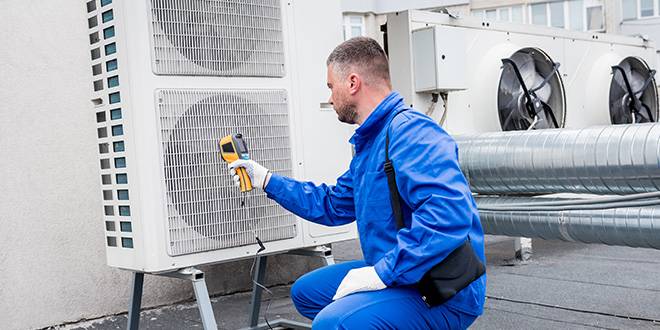
Glossary of Key HVAC Terms
- HVAC (Heating, Ventilation, and Air Conditioning): Systems and technology that regulate temperature, humidity, and air quality in homes and buildings.
- Heat Pump: A device that transfers heat from outside air to warm your home in winter and cool it in summer.
- Furnace: A heating unit that generates warm air through fuel combustion, such as gas or propane.
- Ductwork: A network of tubes that distribute conditioned air throughout your home.
- Thermostat: A device used to control the temperature of your HVAC system.
- Efficiency Rating: A measure of how effectively a heating or cooling unit uses energy.
Why Winter HVAC Inspections Matter
As winter approaches, ensuring your HVAC system is in prime working condition is key to maintaining a warm and comfortable home. Cold-weather inspections offer specific advantages, protecting you from untimely breakdowns, maximizing energy efficiency, and extending the lifespan of your equipment. Whether you use a furnace, heat pump, or other heating system, winter inspections catch minor issues early—before they become costly repairs or emergencies.
During a winter inspection, a trained HVAC technician will thoroughly assess each part of your heating system, from the furnace itself to the air filters and ductwork. At Cartwright Heat & Air, our experienced team knows exactly what to look for to ensure you stay comfortable, safe, and efficient all season long.
Key Benefits of a Winter HVAC Inspection
1. Avoid Costly Emergency Repairs
When temperatures drop, your heating system is expected to run for extended periods. However, if there are underlying issues, increased wear and tear can lead to system malfunctions at the most inconvenient times. A winter HVAC inspection identifies potential issues—like worn-out belts, loose connections, and failing sensors—before they can lead to expensive emergency repairs.
For example, minor furnace problems like a cracked heat exchanger can be caught early with routine heating maintenance. Addressing small issues now can prevent uncomfortable breakdowns and avoid premium repair fees.
2. Improve System Efficiency and Reduce Energy Bills
A clean, well-maintained HVAC system runs more efficiently, consuming less energy and keeping utility bills in check. During a winter inspection, technicians often clean or replace air filters, remove dirt from blower fans, and ensure all components are functioning smoothly. A heating maintenance check also involves inspecting and sealing any duct leaks that may allow warm air to escape, which ensures your home heats up faster and stays warmer for longer.
Not only does this attention to detail lead to consistent comfort, but it can also reduce your energy costs by as much as 10-15%. Winter inspections are a simple yet effective way to keep monthly bills in check during the colder months.
3. Extend the Lifespan of Your System
Regular maintenance and inspection can extend the life of your HVAC system significantly. With a thorough inspection, HVAC components are kept in good condition, allowing the system to work efficiently without overstraining. Even if your unit is relatively new, routine maintenance allows it to last as long as possible.
For instance, both heat pumps and furnaces benefit from inspections that reveal and resolve minor wear and tear before it becomes a more significant problem. By caring for your equipment seasonally, you can postpone the expense of a new system, potentially extending the life of your HVAC by up to 5 years or more.
4. Enhanced Indoor Air Quality
Indoor air quality is another essential consideration in winter, as homes are often closed up tightly against the cold, limiting fresh air flow. Dust, allergens, and other pollutants can accumulate quickly within your heating system, particularly if air filters haven’t been changed in some time. During a winter inspection, a technician will inspect and replace filters as needed, helping to reduce airborne particles and improve overall air quality.
A system inspection by Cartwright Heat & Air includes a comprehensive filter check, along with any necessary duct cleaning or repairs, to ensure that you and your family breathe clean, fresh air throughout the winter season.

Winter HVAC Inspection Data: What’s the Difference?
| Inspection Benefit | Without Inspection | With Winter HVAC Inspection |
| System Efficiency | 10-15% higher energy consumption | Optimized for energy savings |
| Repair Costs | High risk of emergency repairs | Minor repairs or preventive fixes only |
| System Lifespan | Reduced due to unaddressed wear and tear | Extended through regular maintenance |
| Indoor Air Quality | Higher levels of dust, allergens | Cleaner air with fresh filters |
| Comfort Consistency | Frequent hot and cold spots | Steady, comfortable temperature |
Fun Facts About Winter Heating
- Your Furnace Works Harder in Winter: During winter months, a furnace can run almost 10-15 times longer than in any other season.
- Small Changes Make Big Impacts: Simply replacing a clogged air filter can lower energy usage by up to 15%—a small investment for significant savings.
- Early Maintenance Means Savings: Industry studies reveal that preventive HVAC maintenance can save homeowners as much as $1,000 annually in repair costs.
Winter HVAC Inspection FAQ
- Why do I need an HVAC inspection in winter?
A winter inspection ensures your heating system is ready for peak usage, minimizing the risk of unexpected breakdowns while maximizing energy efficiency. - How often should I get my HVAC system inspected?
Ideally, an HVAC system should be inspected twice a year—in the spring and fall. However, at the very least, an inspection should be performed before winter begins. - Will an inspection improve indoor air quality?
Yes! By inspecting and potentially replacing air filters, winter inspections reduce allergens, dust, and pollutants, enhancing air quality. - Is a winter inspection different from a summer inspection?
Yes. Winter inspections focus on the heating components of your system, such as the furnace or heat pump, whereas summer inspections focus on cooling components like the AC unit. - What if my HVAC system is newer? Do I still need an inspection?
Yes. Even newer systems benefit from seasonal inspections, which ensure that all components are working efficiently and help catch any issues early. - How long does a typical HVAC inspection take?
Most inspections take around 1 to 2 hours, depending on the type and condition of the system. - Will I need to be home during the inspection?
Yes, it’s generally recommended for homeowners to be present to discuss any findings with the technician.
Do You Need a Winter HVAC Inspection? Take Our Quiz!
- Have you noticed inconsistent temperatures in your home this winter?
- Yes ⬜ No ⬜
- Have your energy bills been increasing month-over-month?
- Yes ⬜ No ⬜
- Has your heating system been making strange noises or showing any signs of wear?
- Yes ⬜ No ⬜
- Is your heating system over five years old?
- Yes ⬜ No ⬜
- Do you or any family members suffer from allergies or respiratory issues?
- Yes ⬜ No ⬜
If you answered “Yes” to any of these questions, a winter HVAC inspection by Cartwright Heat & Air can help address these issues before they worsen.

Stay Cozy This Winter with Cartwright Heat & Air
Winter is the time to keep your HVAC system in top working condition. An HVAC inspection ensures that your heating system is safe, efficient, and ready to keep your home warm. At Cartwright Heat & Air, our team provides thorough, reliable inspections designed to prevent breakdowns, reduce energy costs, and enhance your indoor air quality. Don’t wait until it’s too late—contact us today to schedule your winter HVAC inspection and stay comfortable all season long!








